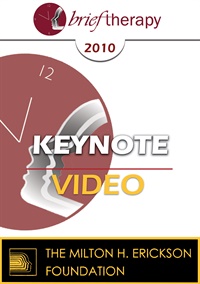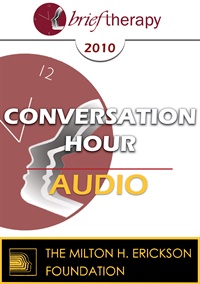
- Average Rating:
- Not yet rated
- Topic Areas:
- Conversation Hours | Brief Therapy | Couples Therapy | Intimacy | Sex and Sexuality
- Categories:
- Brief Therapy Conference | Brief Therapy Conference 2010
- Faculty:
- Esther Perel, MA, LMFT
- Duration:
- 57:04
- Format:
- Audio Only
- Original Program Date:
- Dec 11, 2010
- Short Description:
- BT10 Conversation Hour 05 - Mating in Captivity - Esther Perel, MA, LMFT Mating in Captivity Conversation with Esther Perel
- Price:
- $15.00 - Base Price

- Average Rating:
- Not yet rated
- Topic Areas:
- Couples Therapy | Family Therapy | Conversation Hours | Brief Therapy
- Categories:
- Brief Therapy Conference | Brief Therapy Conference 2010
- Faculty:
- Frank Dattilio, PhD, ABPP
- Duration:
- 1:03:01
- Format:
- Audio Only
- Original Program Date:
- Dec 11, 2010
- Short Description:
- BT10 Conversation Hour 06 - Couple and Family Therapy - Frank Dattilio, PhD, ABPP Couple and Family Therapy with Frank Dattilio
- Price:
- $15.00 - Base Price
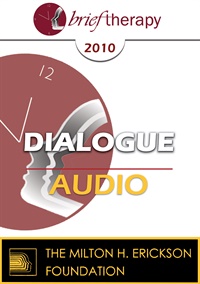
- Average Rating:
- Not yet rated
- Topic Areas:
- Couples Therapy | Dialogues | Affairs | Brief Therapy
- Categories:
- Brief Therapy Conference | Brief Therapy Conference 2010
- Faculty:
- Pat Love, EdD | Esther Perel, MA, LMFT
- Duration:
- 59:03
- Format:
- Audio Only
- Original Program Date:
- Dec 11, 2010
- Short Description:
- BT10 Dialogue 04 - Affairs - Pat Love, EdD, Esther Perel, MA, LMFT Affairs, a dialogue with Pat Love and Esther Perel
- Price:
- $15.00 - Base Price
- Average Rating:
- Not yet rated
- Topic Areas:
- Couples Therapy | Keynotes | Brief Therapy | Relationships
- Categories:
- Brief Therapy Conference | Brief Therapy Conference 2010
- Faculty:
- Sue Johnson, EdD
- Course Levels:
- Master Degree or Higher in Health-Related Field
- Duration:
- 1:14:04
- Format:
- Audio and Video
- Original Program Date:
- Dec 09, 2010
- Short Description:
- Couple therapy will flourish as this field integrates research from social and neuropsychology and clarifies the processes that mediate change in love relationships. It will address more and more “individual” physical and mental health problems, relationship traumas and sexual issues. We can integrate science and the sizzle of “hot” emotion to transform individuals and relationships.
- Price:
-
Sale is $29.00
price reduced from Base Price - $59.00

- Average Rating:
- Not yet rated
- Topic Areas:
- Couples Therapy | Short Courses | Intimacy | Relationships | Brief Therapy | Psychotherapy
- Categories:
- Brief Therapy Conference | Brief Therapy Conference 2010
- Faculty:
- Robert Johansen, PhD | Ian Johansen, PhD | Todd Gaffney, PhD
- Duration:
- 1:29:17
- Format:
- Audio Only
- Original Program Date:
- Dec 09, 2010
- Short Description:
- This workshop will introduce a new cognitive model for brief, solution-focused psychotherapy for couples. This cognitive paradigm is unique in several ways. It points to the fact that no one knows the client better than his/her intimate partner. The client’s partner pushes, pulls, and teases every imperfection of out their partner’s personality. Specifically, intimacy reveals what is incomplete about the client’s emotional development. It also reveals how effectively the client manages the needs he or she brings to the relationship. This is precisely what clients need to study themselves and points to what we as therapists can do to help our clients. With Robert Johansen, Ian Johansen and Todd Gaffnet.
- Price:
- $15.00 - Base Price
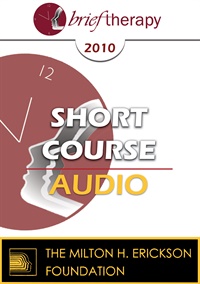
- Average Rating:
- Not yet rated
- Topic Areas:
- Couples Therapy | Short Courses | Brief Therapy
- Categories:
- Brief Therapy Conference | Brief Therapy Conference 2010
- Faculty:
- John Lentz, D. Min.
- Duration:
- 1:06:15
- Format:
- Audio Only
- Original Program Date:
- Dec 09, 2010
- Short Description:
- This brief therapy approach works with any therapeutic perspective to provide new tools for helping couples move beyond fighting. Utilizing resources couples naturally posses, this approach helps couples return to a state of being in love, and offer tools that can help them return there at will.
- Price:
- $15.00 - Base Price
Tags: Brief Therapy Couples Therapy
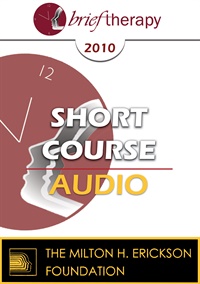
- Average Rating:
- Not yet rated
- Topic Areas:
- Short Courses | Brief Therapy | Couples Therapy | Family Therapy | Solution Oriented Approach
- Categories:
- Brief Therapy Conference | Brief Therapy Conference 2010
- Faculty:
- Michael Reiter, PhD | Arlene Brett-Gordon, PhD
- Duration:
- 1:20:35
- Format:
- Audio Only
- Original Program Date:
- Dec 09, 2010
- Short Description:
- This workshop will explain how solution-focused brief therapy can be used in a marathon session format to assist couples and families during turbulent points of their relationship. The workshop will highlight the structure and intricacies of solution-focused marathon sessions. By utilizing this format only one or two sessions may be necessitated. With Michael Reiter and Arlene Brett-Gordon.
- Price:
- $15.00 - Base Price
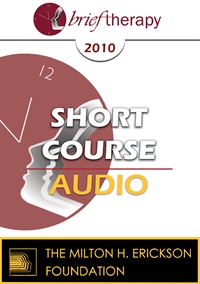
- Average Rating:
- Not yet rated
- Topic Areas:
- Couples Therapy | Short Courses | Gestalt | Intimacy | Relationships | Neurobiology | Neuroscience
- Categories:
- Brief Therapy Conference | Brief Therapy Conference 2010
- Faculty:
- Roberta Karant, PhD | Stefan Deutsch
- Duration:
- 1:33:35
- Format:
- Audio Only
- Original Program Date:
- Dec 09, 2010
- Short Description:
- Couples in distress minimize and numb their pain by avoiding contact. By writing a vision of what they both want, the therapist can focus the couple on the future. By combining Gestalt concepts with those popularized by Hendrix and others, therapists can have a powerful effect on quickening the healing process. New sessions will involve writing, note taking, and an agreed upon assignment to be practiced during the week. With Roberta Karant and Stefan Deutsch.
- Price:
- $15.00 - Base Price
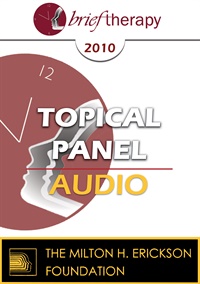
- Average Rating:
- Not yet rated
- Topic Areas:
- Couples Therapy | Topical Panels | Brief Therapy
- Categories:
- Brief Therapy Conference | Brief Therapy Conference 2010 | Pioneers in Couples and Family Therapy
- Faculty:
- Jon Carlson | Sue Johnson, EdD | Pat Love, EdD | Michele Weiner-Davis, LCSW
- Duration:
- 1:01:15
- Format:
- Audio Only
- Original Program Date:
- Dec 11, 2010
- Short Description:
- This panel explores brief models of couple therapy grounded in emotional attunement, mindfulness, and systemic thinking. Presenters examine contract-setting, attachment repair, and affective resonance as core strategies. They address EFT, solution-focused methods, and managing addiction or individual distress within the couple system—while preserving hope and therapeutic momentum.
- Price:
- $15.00 - Base Price
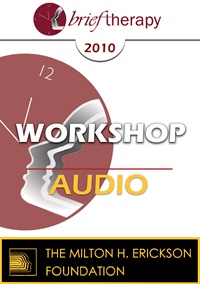
- Average Rating:
- Not yet rated
- Topic Areas:
- Couples Therapy | Workshops
- Categories:
- Brief Therapy Conference | Brief Therapy Conference 2010
- Faculty:
- Sue Johnson, EdD
- Duration:
- 2:07:03
- Format:
- Audio Only
- Original Program Date:
- Dec 09, 2010
- Short Description:
- BT10 Workshop 01 - Working with Emotion in Couple Therapy - Sue Johnson, EdD This workshop will focus on unpacking negative emotional responses that fuel a couple’s dance of distress and using emotion to shape powerful positive bonding interactions that then fuel transformative positive emotions. Theory, research and interventions will be outlined with the viewing of therapy sessions and experiential exercises.
- Price:
- $15.00 - Base Price
Tags: Couples Therapy
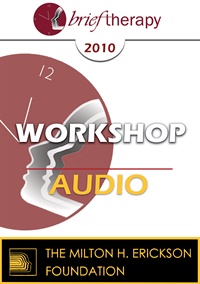
- Average Rating:
- Not yet rated
- Topic Areas:
- Couples Therapy | Workshops | Sex and Sexuality
- Categories:
- Brief Therapy Conference | Brief Therapy Conference 2010
- Faculty:
- Pat Love, EdD
- Duration:
- 2:22:38
- Format:
- Audio Only
- Original Program Date:
- Dec 09, 2010
- Short Description:
- BT10 Workshop 02 - Sexy Body/Sexy Brain: A New Way of Understanding Sexual Response - Pat Love, EdD Sexual satisfaction is a sheer delight of life yet many clients fail to achieve it. Couples and individuals alike, struggle with understanding the complexity of sexual response and contentment. Come learn a new paradigm designed to elucidate hidden keys to sensual pleasure. Short lecture, video, experiential exercise.
- Price:
- $15.00 - Base Price
Tags: Relationships
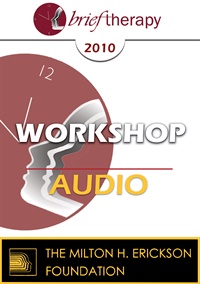
- Average Rating:
- Not yet rated
- Topic Areas:
- Couples Therapy | Workshops | Brief Therapy | Relationships | Treatment Planning
- Categories:
- Brief Therapy Conference | Brief Therapy Conference 2010
- Faculty:
- Pat Love, EdD
- Duration:
- 1:57:30
- Format:
- Audio Only
- Original Program Date:
- Dec 10, 2010
- Short Description:
- This brief model has a powerful effect on couples. Misleading in its simplicity but potent in its outcome, the Three C’s approach uses the couples’ own words to design and realign the relationship in a strategic manner. Lecture, live demonstration, experiential exercise and discussion will be used for meaningful exchange.
- Price:
- $15.00 - Base Price
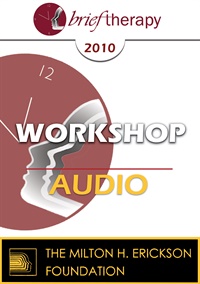
- Average Rating:
- Not yet rated
- Topic Areas:
- Couples Therapy | Workshops | Marriage
- Categories:
- Brief Therapy Conference | Brief Therapy Conference 2010 | Pioneers in Couples and Family Therapy
- Faculty:
- Michele Weiner-Davis, LCSW
- Duration:
- 2:30:13
- Format:
- Audio Only
- Original Program Date:
- Dec 10, 2010
- Short Description:
- When one partner wants out, hope can feel out of reach. This workshop offers clear, practical interventions for working with couples on the brink—where divorce is imminent, one partner is disengaged, or infidelity is ongoing. With a structured, strategic approach, it demonstrates how therapists can reframe stuck dynamics, reignite possibility, and help clients move from despair to collaborative repair.
- Price:
- $15.00 - Base Price
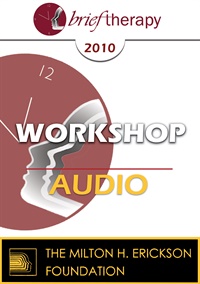
- Average Rating:
- Not yet rated
- Topic Areas:
- Couples Therapy | Workshops | Intimacy | Sex and Sexuality
- Categories:
- Brief Therapy Conference | Brief Therapy Conference 2010
- Faculty:
- Esther Perel, MA, LMFT
- Duration:
- 2:11:17
- Format:
- Audio Only
- Original Program Date:
- Dec 10, 2010
- Short Description:
- BT10 Workshop 28 - The Double Flame: Reconciling Intimacy and Sexuality - Esther Perel, MA, LMFT This workshop probes the intricacies of love and desire—how they relate and how they conflict. Participants will learn how emotional intimacy can inhibit sexual desire and why “good intimacy” doesn’t necessarily make for “good sex.” Through case material and video vignettes, we’ll explore how our emotional history: “how we were loved” shapes our erotic blueprints and expresses itself in the physicality of sex: “how we make love”. We will show how to break through erotic impasses and help couples balance the dual needs for security and freedom. This model applies to couples and individuals from all sexual orientations.
- Price:
- $15.00 - Base Price
Tags: Intimacy Relationships
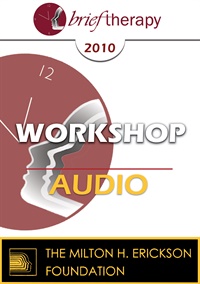
- Average Rating:
- Not yet rated
- Topic Areas:
- Attachment | Couples Therapy | Neuroscience | Workshops | Developmental Therapy Model | Differentiation
- Categories:
- Brief Therapy Conference | Brief Therapy Conference 2010 | Pioneers in Couples and Family Therapy
- Faculty:
- Ellyn Bader, PhD
- Duration:
- 1:54:30
- Format:
- Audio Only
- Original Program Date:
- Dec 12, 2010
- Short Description:
- The workshop delves into couples therapy by integrating attachment theory, differentiation, and neuroscience. Participants learn about relationship developmental stages, attachment styles, and conflict resolution techniques like the "ouch" method. The session explores challenges with different couple types, gender dynamics, and personal histories, using case studies to demonstrate how self-disclosure, addressing unresolved issues, and differentiation-based approaches can help couples develop deeper emotional connections and personal growth.
- Price:
- $15.00 - Base Price
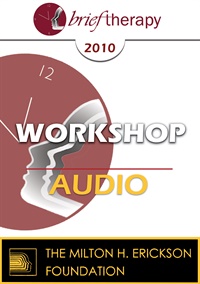
- Average Rating:
- Not yet rated
- Topic Areas:
- Cognitive Behavior Therapy (CBT) | Couples Therapy | Workshops
- Categories:
- Brief Therapy Conference | Brief Therapy Conference 2010
- Faculty:
- Frank Dattilio, PhD, ABPP
- Duration:
- 2:02:42
- Format:
- Audio Only
- Original Program Date:
- Dec 12, 2010
- Short Description:
- BT10 Workshop 40 - Cognitive-Behavioral Techniques with Couples - Frank M. Dattilio, PhD, ABPP This workshop focuses on the specific use of cognitive-behavioral strategies as an adjunct to the many treatment modalities of couples therapy. It offers a basic overview of the theories of cognitive-behavioral therapy, particularly as it applies to couples. Participants will learn first-hand techniques and strategies for working with difficult couples and how to integrate these strategies with their respective modes of treatment. The presentation is followed by a videotape that demonstrates the implementation of techniques and interventions.
- Price:
- $15.00 - Base Price
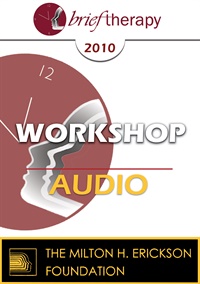
- Average Rating:
- Not yet rated
- Topic Areas:
- Meditation, Spirituality and Yoga | Workshops | Marriage | Mindfulness | Brief Therapy | Buddhism | Couples Therapy
- Categories:
- Brief Therapy Conference | Brief Therapy Conference 2010
- Faculty:
- Jon Carlson
- Duration:
- 2:51:00
- Format:
- Audio Only
- Original Program Date:
- Dec 12, 2010
- Short Description:
- Mindfulness is a deceptively simple way of relating to experience that has been successfully practiced for over 2500 years to alleviate human suffering and to increase awareness. Recently clinicians are discovering that mindfulness holds great promise as an add-on to couples therapy and education leading to greater kindness, love and acceptance. This program will discuss, demonstrate and offer experiential activities on how mindfulness can facilitate brief changes when working with couples.
- Price:
- $15.00 - Base Price

- Average Rating:
- Not yet rated
- Topic Areas:
- Couples Therapy | Conversation Hours | Sex and Sexuality | Infidelity | Love
- Categories:
- Brief Therapy Conference | Brief Therapy Conference 2012
- Faculty:
- Esther Perel, MA, LMFT
- Duration:
- 59:25
- Format:
- Audio Only
- Original Program Date:
- Dec 07, 2012
- Short Description:
- BT12 Conversation Hour 10 – Rethinking Couples Therapy: A Radical Approach to Love, Sex, and Infidelity – Esther Perel, MA, LMFT Educational Objectives: Learn the philosophies of various practitioners and theorists.
- Price:
- $15.00 - Base Price
Tags: Couples Therapy Love
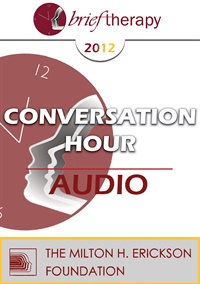
- Average Rating:
- Not yet rated
- Topic Areas:
- Couples Therapy | Hypnosis | Conversation Hours | Metaphors | Brief Therapy
- Categories:
- Brief Therapy Conference | Brief Therapy Conference 2012
- Faculty:
- Wendel Ray, PhD
- Duration:
- 52:29
- Format:
- Audio Only
- Original Program Date:
- Dec 07, 2012
- Short Description:
- BT12 Conversation Hour 11 – 1956 Flashback: Hypnosis, Paradox, Metaphorical Tasks & The Invention of Brief Couples Therapy – Wendel Ray, PhD Educational Objectives: Learn the philosophies of various practitioners and theorists.
- Price:
- $15.00 - Base Price
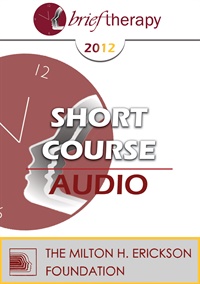
- Average Rating:
- Not yet rated
- Topic Areas:
- Couples Therapy | Short Courses
- Categories:
- Brief Therapy Conference | Brief Therapy Conference 2012
- Faculty:
- Eric Greenleaf, PhD | Christine Guilloux, DESS Psychology
- Duration:
- 1:23:47
- Format:
- Audio Only
- Original Program Date:
- Dec 05, 2012
- Short Description:
- BT12 Short Course 01 – Two Voices, One Dream: A Brief Therapy Technique for Couples – Eric Greenleaf, PhD, and Christine Guilloux, DESS When we are in love, “Life is like a dream,” and each values the other. This brief exercise reintroduces a loving dream of the couple, utilizing values of childhood and the pleasure of trance to help them accomplish this once again. The female and male therapists induce the trance together.
- Price:
- $15.00 - Base Price
Tags: Couples Therapy Dreams
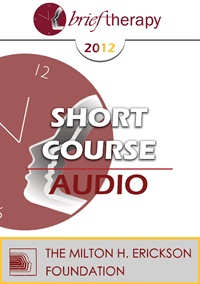
- Average Rating:
- Not yet rated
- Topic Areas:
- Couples Therapy | Short Courses
- Categories:
- Brief Therapy Conference | Brief Therapy Conference 2012
- Faculty:
- Birgitta Gregory, PhD | Bruce Gregory, PhD
- Duration:
- 1:28:56
- Format:
- Audio Only
- Original Program Date:
- Dec 09, 2012
- Short Description:
- BT12 Short Course 35 – An Integrative and Creative Approach Working with Couples Achieving Lasting Solutions – Bruce Gregory, PhD and Birgitta Gregory, PhD This short course will focus on the treatment of couples from the perspectives of symptoms, rigid, dysfunctional behavior patterns, and narcissistic defenses. An integrative approach utilizing creativity and humor will be presented, incorporating CBT, psychodynamic, Ericksonian, Jungian and existential perspectives. Validation, sequencing, containment and questions that facilitate accountability will be highlighted in the context of empowering clients on a variety of levels.
- Price:
- $15.00 - Base Price
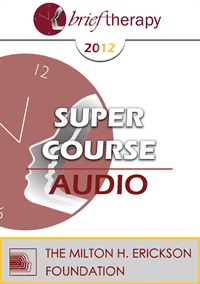
- Average Rating:
- Not yet rated
- Topic Areas:
- Attachment | Neuroscience | Super Courses | Intimacy | Differentiation | Couples Therapy
- Categories:
- Brief Therapy Conference | Brief Therapy Conference 2012 | Pioneers in Couples and Family Therapy
- Faculty:
- Ellyn Bader, PhD
- Duration:
- 1:51:57
- Format:
- Audio Only
- Original Program Date:
- Dec 09, 2012
- Short Description:
- Learn advanced techniques for understanding relationship dynamics, addressing communication challenges, and supporting couples through complex emotional landscapes. Explore attachment styles, therapeutic interventions, and strategies for helping couples navigate conflict, addiction, and personal growth.
- Price:
- $15.00 - Base Price
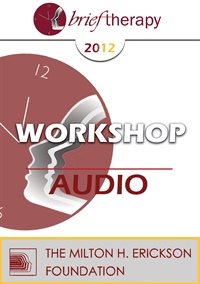
- Average Rating:
- Not yet rated
- Topic Areas:
- Couples Therapy | Infidelity | Workshops
- Categories:
- Brief Therapy Conference | Brief Therapy Conference 2012
- Faculty:
- Wendel Ray, PhD
- Duration:
- 3:00:36
- Format:
- Audio Only
- Original Program Date:
- Dec 06, 2012
- Short Description:
- BT12 Workshop 21 – John Weakland’s Brief Therapy with a Husband Suspected of Infidelity – Wendel Ray, PhD John Weakland’s MRI Brief Therapy is among the most effective & influential models in use today. Video recordings of Weakland working successfully with a husband suspected of infidelity will be reviewed and discussed to demonstrate the MRI Brief Therapy conceptual framework and clinical techniques for competency based brief therapy.
- Price:
- $15.00 - Base Price
Tags: Infidelity Couples Therapy

- Average Rating:
- Not yet rated
- Topic Areas:
- Couples Therapy | Sex and Sexuality | Infidelity | Workshops | Love
- Categories:
- Brief Therapy Conference | Brief Therapy Conference 2012
- Faculty:
- Esther Perel, MA, LMFT
- Duration:
- 2:46:59
- Format:
- Audio Only
- Original Program Date:
- Dec 08, 2012
- Short Description:
- BT12 Workshop 32 – Rethinking Couples Therapy: A Radical Approach to Love, Sex and Infidelity – Esther Perel, MA, LMFT Couples therapists are typically discouraged from seeing partners separately lest power imbalances, allegiances, or secrets further divide the couple. What’s lost in this approach? Through case examples, Esther Perel will show how to effectively engage such issues as intimacy, sexuality and infidelity by creating separate spaces where each partner can explore his/her feelings and experiences along with larger relationship dynamics. We will show how to navigate privacy and secrecy, honesty and transparency, stage interventions around sexual impasses, and structure a safe and flexible environment to work creatively with infidelity.
- Price:
- $15.00 - Base Price
Tags: Couples Therapy Love
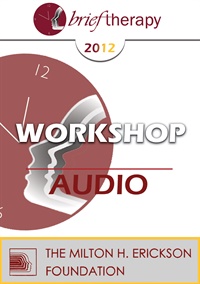
- Average Rating:
- Not yet rated
- Topic Areas:
- Cognitive Behavior Therapy (CBT) | Couples Therapy | Workshops
- Categories:
- Brief Therapy Conference | Brief Therapy Conference 2012
- Faculty:
- Frank Dattilio, PhD, ABPP
- Duration:
- 2:48:16
- Format:
- Audio Only
- Original Program Date:
- Dec 08, 2012
- Short Description:
- BT12 Workshop 34 – Cognitive-Behavioral Techniques with Couples – Frank Dattilio, PhD, ABPP This workshop focuses on the specific use of cognitive-behavioral strategies as an adjunct to the many treatment modalities of couples’ therapy. It offers a basic overview of the theories of cognitive-behavioral therapy, particularly as it applies to couples. Participants will learn firsthand techniques and strategies for working with difficult couples and how to integrate these strategies with their respective modes of treatment. The presentation is followed by a videotape that demonstrates the implementation of techniques and interventions.
- Price:
- $15.00 - Base Price


